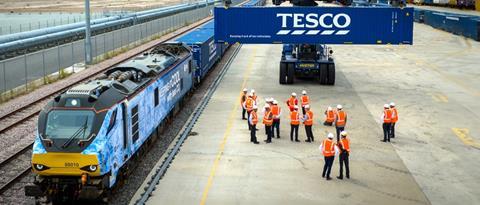The retailer continues to reduce environmental impact of deliveries to stores by swapping road for rail
Tesco is taking a further 31 million cases of goods a year off the roads with the launch this week (1 October) of its 10th rail service.

The latest ‘Tesco train’ will move 600,000 cases per week from its main distribution centre in Daventry, Northamptonshire, to its regional distribution centre in Widnes in the Northwest. This will replace more than 90 weekly lorry trips making the 260-mile round-trip.
Tesco says these improvements will lead to a significant reduction in its road miles, resulting in an annual emission saving of more than 6,000tCO2e.
The new service, in partnership with DRS and Maritime, will move both fresh and dry goods, and will serve 198 Tesco stores, Tesco said in a statement.
Commenting on the launch, Ken Murphy, Tesco Group chief executive, said: “Tesco’s distribution network is one of the most extensive in the UK and plays an important role in our efforts to become carbon neutral in our own operations by 2035. Switching from road to rail allows us to get products to our stores in a more sustainable way, by removing thousands of lorry journeys each year and reducing our carbon emissions.”
According to Tesco figures, heavy goods vehicles make up around 21 per cent of the UK’s domestic transport emissions, so switching to rail can play a significant role in reducing the environmental impact of moving goods around the country.
John Williams, executive chairman – Maritime Group said: “We are pleased to welcome this important new service to our terminal in Manchester, and continue supporting Tesco with ‘final-mile’ deliveries to its regional distribution centre and store locations in the northwest. Tesco’s largest service to date underlines the strategic role of our rail facility in Manchester as a hub for British trade, uniquely placed to offer fast, efficient, low carbon logistics for both international and domestic cargo.”
Tesco said its work to decarbonise its distribution network doesn’t stop there. In addition to moving from road to rail, the retailer is also working to optimise its road transport network by increasing the efficiency where it can.
For example, the supermarket has introduced double decker trailers, leading to a 40 per cent reduction of truck journeys.
It has also worked with suppliers who ordinarily purchase transport on a one-way basis to help align orders. This has enabled Tesco suppliers to work together to purchase both legs of a journey, with 50 per cent fewer vehicles required for these trips.



